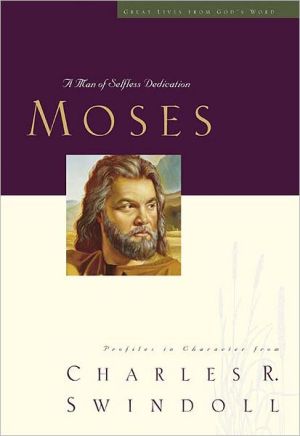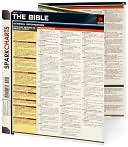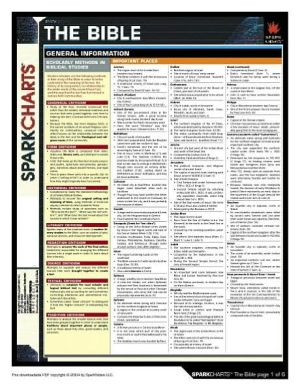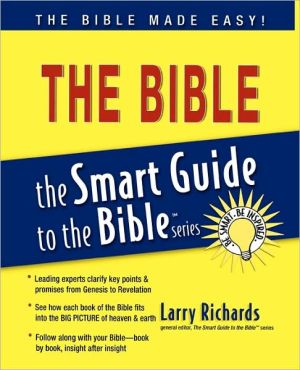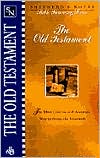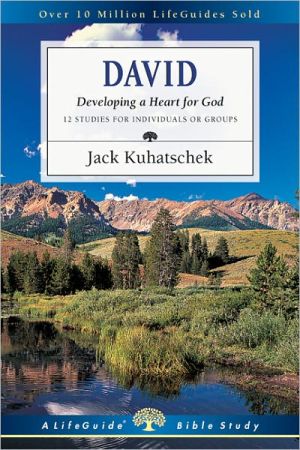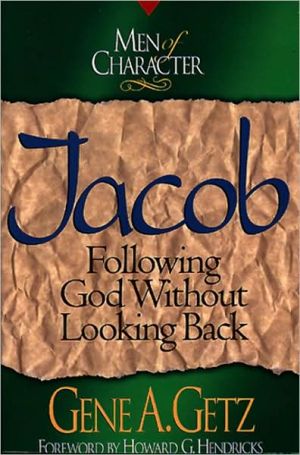Moses: A Man of Selfless Dedication, Vol. 4
Charles Swindoll presents the Bible's real Moses-the Moses who tried to decline his assignment from God; the Moses who dazzled Pharoh; the Moses who received the Ten Commandments; the Moses who was disobedient and weak; the Moses who was the greatest leader of God's people in all of history. Through his faith and selfless dedication, Moses continually chose to follow God's will through difficult and seemingly impossible situations. This is the fourth volume of Swindoll's "Great Lives" series.
Search in google:
Charles Swindoll presents the Bible's real Moses-the Moses who tried to decline his assignment from God; the Moses who dazzled Pharoh; the Moses who received the Ten Commandments; the Moses who was disobedient and weak; the Moses who was the greatest leader of God's people in all of history. Through his faith and selfless dedication, Moses continually chose to follow God's will through difficult and seemingly impossible situations. This is the fourth volume of Swindoll's "Great Lives" series.
\ \ \ \ \ Chapter One\ \ \ Misery, Midwives, and Murder\ \ \ Imagine some scholarly historian in the distant future, probing ancient archives and peering into dim and dusty records for clues about a life in the past.\ Your life.\ As he lays all the puzzle pieces on the table—the faded photographs, the curled pages of a journal, the accounts of your driving record, and credit reports—he begins to draw conclusions about who you were and what you were all about. What factors might that researcher consider as he pulls together his report?\ If he is wise, he will remember that you are a product of your time. All of us are. That's an important point to keep in mind when you're considering anyone's life. We cannot and must not separate a person from his or her times. Our moment in history and our unique, individual circumstances become the anvil upon which our character is beaten out and formed. We will either rise to the challenge of our times, or we will remain stuck on the sidelines.\ Moses became God's man for a transitional epoch in history. When the divine call came to assume a crucial role in the destiny of men and nations, Moses stepped into the gap. He may have been reluctant. He may have been frightened. He may have been filled with regret and self-doubt. But in the end, he yielded ... and became God's instrument in his own generation.\ It is the same in this generation, at this epochal moment at the turn of a millennium. God is still looking for the man or woman who willbelieve Him, despite weaknesses and doubts, and become a mighty tool in His hand ... an instrument of His purpose.\ \ \ AT THE HINGE OF HISTORY\ \ \ Baby Moses opened his eyes on a world very different from our own. Although neither his mother nor father knew it, the birth of this man-child launched a series of events that would change the course of nations and shape the destiny of millions. History would turn like a hinge on that birth. The world would never be the same again.\ The very title of the book where Moses' story begins tips us off that great and climactic events are in the works.\ \ \ Exodus\ \ \ The word means "departure, going out," and that certainly describes the major theme of this second book of the Old Testament. It records the departure of the Israelites from Egypt, where they had lived for more than four hundred years. They had entered the land as a little family; they departed as a huge nation. When Pharaoh finally let God's people go, they took their leave of Egypt and began (what turned out to be) a long, long journey to their own land, the land of Canaan.\ Exodus records great events and high drama. It actually continues the Book of Genesis, with a lapse of several centuries in between. Exodus picks up where Genesis leaves off, some three hundred fifty years later. And the connection between those two books is one of the most fascinating accounts in all of history.\ \ \ THE TRANSITIONAL MAN\ \ \ The main character toward the end of Genesis is a man named Joseph. (For a fuller telling of his story, you might enjoy another volume in this series, Joseph: A Man of Integrity and Forgiveness.) Hated and mistreated by jealous brothers, Joseph was kidnapped as a naïve teenager and sold as a slave to a passing caravan bound for Egypt. Through time and a chain of incredible events, God greatly honored this young man and promoted him out of slavery, out of the bowels of an Egyptian dungeon, to the right hand of Pharaoh himself. Against all odds, he became prime minister of the most powerful nation in the ancient world.\ And here's the big surprise: Joseph, the remarkable ex-slave who rose to such stellar heights of power and prestige, was a Jew, a Hebrew like his father and brothers.\ And what a name this young man made for himself! Time and again Joseph showed his brilliance. God gave him insight to handle vast and perplexing problems. Pharaoh quickly recognized this and exalted him, putting him in charge of the agriculture and economy of the nation.\ And it was a good thing, too, because just at that time a terrible famine swept the land. Warned by God, Joseph saw it coming and prepared for it. Not so with Jacob and his sons back in Canaan. They would have died of starvation had they stayed put. Instead, several of them traveled to Egypt seeking grain and eventually came before the ruler of that land—their own long-lost younger brother. After a warm and moving family reunion, Joseph invited his brothers and father to move to Egypt so they might enjoy plenty of grain and a fine spread of land where they could raise crops and graze their flocks.\ If you hope to appreciate the exodus, you must understand how the Hebrews got to this foreign land in the first place. The children of Jacob were not made for Egypt! They were made for Canaan, that rich and renewed land of promise that awaited their return.\ Pharaoh responded to the arrival of Jacob's family with open and generous hands:\ \ \ Then Pharaoh said to Joseph, "Your father and your brothers have come to you. The land of Egypt is at your disposal; settle your father and your brothers in the best of the land, let them live in the land of Goshen; and if you know any capable men among them, then put them in charge of my livestock."\ Genesis 47:5-6\ \ \ What an astounding offer! It reveals how highly Pharaoh regarded his right-hand man. The king said to Joseph, "Your family has come. That's wonderful. Give them the best of the land! Let them settle in Goshen. Let them graze their animals and help me tend my own my livestock while they're at it. I accept them wholeheartedly, Joseph."\ Because of Pharaoh's kindness, Joseph could welcome his family to this alien land and provide them with a beautiful layout beyond anything they might have imagined. He told them, "So therefore, do not be afraid; I will provide for you and your little ones." So he comforted them and spoke kindly to them" (Genesis 50:21).\ But as great as it was, the king's magnanimous offer of refuge and provision wasn't the most amazing part of this story. Even more remarkable was the lack of bitterness in Joseph's heart toward the brothers who had hated and mistreated him. He said to them, "Don't worry. Be at peace. All is well. Come on in and I'll take care of you and your families." And so through such strange and marvelous circumstances, the sons of Israel came to live in Egypt.\ At that time, of course, they were only an extended family, a small band of bewildered refugees. You could have loaded the whole tribe on a couple of Greyhound buses. But since such transport wasn't available, these brothers and their elderly father gathered their belongings and began the long walk to the south. Yet even when they arrived at the border as foreigners, the Egyptians didn't stick them in some fenced-off refugee camp to ferret out a meager life as best they could. They were given choice real estate, a prime slice of Egyptian heartland, where they might live and raise their families in peace.\ \ \ CHANGE ON THE HORIZON\ \ \ For about seventy-one years after that radical relocation, life rolled along like the lazy Nile River. Scripture tells us, "Now Joseph stayed in Egypt, he and his father's household, and Joseph lived one hundred and ten years (47:22). Joseph was probably thirty-nine years old when his family set up shop in Egypt. He lived for seventy-one years after that, then breathed his last. The very last verse of the Book of Genesis says it succinctly: "So Joseph died at the age of a hundred and ten years; and he was embalmed and placed in a coffin in Egypt" (50:26).\ That worthy man's quiet passing marked the beginning of the end of the good life for the Hebrews in Egypt. With Joseph lying in his coffin, life began to change for these transplanted Jews—subtle changes at first (they usually are), but soon the Israelites' fortunes plunged like the stock market of October 1929—all the way to the bottom.\ By this time, the population of Jews in Egypt had exploded. The often spring of Jacob's sons grew in number until they became a mighty people in Egypt ... to the growing dismay of Egyptian officials.\ With Joseph no longer on the scene to represent and put in a good word for his kinfolk, the Egyptian attitude toward these "foreign Hebrews soured. The native population began to look upon Israel with narrowed eyes and growing suspicion. And as we know all too well from our world bloody history, mounting suspicion toward a people group is only a step away from prejudice ... yet another step away from persecution ... and but a stone's throw from genocide.\ Where did that prejudice come from? I think we can identify at least two sources for it.\ \ \ LOATHSOME SHEPHERDS\ \ \ Many years before, Joseph had warned his brothers about something very specific in the Egyptian culture. It's a little thing, easy for us to miss—and I strongly suspect that Joseph's brothers missed it, too.\ Now, when you're given a heads up about living in a foreign culture you'd better pay close attention. When I was a young Marine, about to enter Japan for the first time, I'll never forget how our colonel stood before us, describing the new way of life into which we were stepping. This was not going to be like driving the highways of North Carolina, strolling the streets of some dusty town in Texas, or kicking back on the beaches in Southern California. We were guests in another land. We would be regarded with suspicion by some, hostility by others. Many of us had never before been foreigners.\ That's the way it was when Joseph gave his brothers the inside scoop about Egypt. Listen to his counsel:\ \ \ Joseph said to his brothers and to his father's household ... "When Pharaoh calls you and says, `What is your occupation?' you shall say, `Your servants have been keepers of livestock from our youth even until now, both we and our fathers,' that you may live in the land of Goshen; for every shepherd is loathsome to the Egyptians." (46:31, 33-34)\ \ \ Joseph told them, "Whatever you do, guys, don't tell Pharaoh you're shepherds! Keep that part under your hats, all right? Just tell him you're keepers of livestock."\ Now, why would he say that? Because Joseph knew that shepherds were "loathsome to the Egyptians."\ Let me add a little background here. At that time, the Egyptian culture had risen to a high water mark. Its residents were expected to display a certain level of sophistication. You might say it was the Nob Hill of that era. Educationally, it topped the pile. The Egyptians' advanced hieroglyphics, their fine universities, and their enviable economic situation all made them look askance at any group of refugees or expatriates who might corrupt their good fortune. And they certainly didn't want to import a group of lowly shepherds who could tarnish their nation's high-gloss image. (There goes the neighborhood!)\ Old Testament scholars Keil and Delitzsch add this interesting insight:\ \ \ The dislike of the Egyptians to shepherds arose from the fact that the more completely the foundations of Egypt rested upon agriculture, the more did the Egyptians associate the idea of rudeness and barbarism with the very name of a shepherd. This is ... attested in various ways by the monuments on which shepherds are constantly depicted as lanky and withered, distorted, emaciated, and sometimes almost ghostly figures.\ \ \ In other words, shepherds were the low-lifes. Strictly bush-leaguers And to use the shepherd-word at this tender point in the relationship with Pharaoh would definitely mean starting off on the wrong sandal.\ Think back to the days when portions of the American West were being settled, and you'll get a similar picture. Beef barons and sheep ranchers competed for land and profits, and these guys never joined the same bowling teams, I promise you. If you visited a cow town, you didn't walk into a crowd of cowboys and announce you were a shepherd with a big flock of woolies grazing on the outskirts of town. One of the cowboy would probably sniff the air and say, "Ah smell sheep." At that point, you would need to either fight, duck, shoot, or flee. Fast!\ Pharaoh, apparently, ran cattle, while Jacob's boys were sheep-herder So Joseph told them, "Look, when the king asks you what you do for a living, just tell him you handle livestock. Keep it generic, and that'll work great. Don't announce that you're shepherds."\ Sadly, they either forgot their brother's advice or disregarded it. When Pharaoh asked them to name their occupations, they piped up, "Your servants are shepherds, just as our fathers were." As time passed, the growing number of Jewish shepherds became an Issue (with a capital "I") among the people of Egypt.\ That's one source of the prejudice the Israelites eventually ran up against. But I believe something even deeper than that caused the real problems.\ \ \ THE FORGOTTEN MAN\ \ \ The first chapter of Exodus reveals a strong second reason why times became so hard for the Hebrews. Not only were they tenders of sheep in land that hated shepherds, but Scripture also tells us, "Now a new king arose over Egypt, who did not know Joseph" (Exodus 1:8).\ The day came, after the deaths of Joseph and the Pharaoh who had promoted him, that a new Pharaoh stepped onto the throne. He too ruled, then passed the crown to the next Pharaoh. Finally, after several centuries, the name Joseph became virtually unknown. No one remembered the famine. No one recalled the golden oceans of stored grain. No one recollected how a wise, young Jewish prime minister had stepped out of obscurity to save the day. That was ancient history. Irrelevant. And the bilateral policy established between Joseph and some long-gone Pharaoh? Completely forgotten.\ This new Pharaoh despised the growing Hebrew population. How had they even come to be there? No one knew for sure; the reports had been filed away in some forgotten basement archive.\ But one thing about these multiplying Hebrews could not be ignored: They seemed to pose a threat. And a threatened Pharaoh was not a pleasant Pharaoh to have around. He said to his people,\ \ \ "Behold, the people of the sons of Israel are more and mightier than we. Come, let us deal wisely with them, or else they will multiply and in the event of war, they will also join themselves to those who hate us, and fight against us and depart from the land." (vv. 9-10)\ \ \ And so a whole new way of life came to pass for the Hebrews. Notice the change. It's a sad scene. "So they appointed taskmasters over them to afflict them with hard labor. And they built for Pharaoh storage cities, Pithom and Raamses" (v. 11).\ As I read those ominous words, I can't help but recall the dark days prior to World War II when the fortunes of Jewish people in another land—Germany—changed so drastically under a hateful new ruler named Adolph Hitler. Not only were Jews murdered and huddled into death camps, they were also forced into cruel corporate slavery by some of the Reich's largest companies. Housed in inhuman conditions, many of these modern-era slaves were simply worked to death.\ What happened in Egypt seems a strange foreshadowing of that tragic era. A whole new scene took place in the land of the Nile, the likes of which none of us could imagine. All too suddenly for the bewildered Israelites, a devastating new policy came into effect ... and life would never be the same.\ Exit: ease, abundance, and prosperity.\ Enter: taskmasters and the whip.\ Archaeologists have greatly helped us to understand this portion of Scripture. They have unearthed obelisks and monuments and columns etched with all manner of figures and hieroglyphics. One interesting discovery featured a mural, depicting a large group of laborers working under two superior officers armed with heavy lashes. Their task? Making bricks. The two holding the whips were portrayed as crying out, "Work without fainting!"\ Think of that! As long as Joseph lived, the Israelites knew peace and joy and relaxation in the sunny fields of Goshen. But then the wind shifted Clouds began to darken the horizon, and a chill crept into the air. Their Egyptian neighbors began to look at them differently—at first with suspicion and distaste, then with outright hatred.\ Before anyone could figure out what had gone wrong and what they might do, the taskmasters appeared on the scene, like an angry troop of jack-booted SS officers. Gone were the idyllic days of shepherding. Henceforth they were to make bricks under the snarl of slave drivers and the crack of the lash.\ \ \ AN ENDURING PROMISE\ \ \ And so it might have remained until the Hebrews were ground into the Egyptian dust. Scripture says, "The Israelites groaned in their slavery and cried out, and their cry for help ... went up to God" (Exodus 3:23, NIV.)\ God heard that cry. He had not been sleeping. His attention had not drifted. He well remembered His promise to the sons and daughters Jacob. Way back, centuries before Exodus chapter I, God spoke to Abram the father of the Hebrews, and unveiled a prophecy regarding that man's descendants:\ \ \ God said to Abram, "Know for certain that your descendants will be strangers in a land that is not theirs, where they will be enslaved and oppressed four hundred years. But I will also judge the nation whom they will serve, and afterward they will come out [Exodus!] with many possessions."\ Genesis 15:13-14\ \ \ "My son," God told Abram, "your progeny will grow in number, and they will enter a land where they were not born. They will be strangers in that foreign land and they will be abused and enslaved. But they won't stay there forever! After several hundred years under the yoke of that brutal people, they will be delivered. They will leave that land."\ A deliverer would come, a man hand-picked by God Himself—a leader uniquely prepared to deal with both Israelites and the Pharaoh himself.\ His name would be Moses.\ \ \ DESPERATE MEASURES\ \ \ Return with me to the first chapter of Exodus for a moment. Let's look at life under the pharaohs and the taskmasters. With whips at their backs, the Israelites built two new cities for the Egyptians. You would think all of that hard labor and bitter persecution might have put a crimp in the Israelite baby boom. Not so! These folks were prolific: "But the more they were oppressed, the more they multiplied and spread; so the Egyptians came to dread the Israelites and worked them ruthlessly" (1:12-13, NIV).\ The Egyptians looked upon the growing number of Israelites (a "mighty people," Pharaoh called them) with dread. The Hebrew word translated "dread" is kootz. It means "to have an abhorrence for and horror, a sickening feeling." When the officers of Egypt noted the swelling population of Hebrews from month to month and year to year, they felt sick in the pit of their stomachs. Had there been coffee shops in those days, John and Jane Egyptian might have sat at those little round tables and said over their lattes, "Man, this thing is getting out of hand. Our plan isn't working. We've got to stop that growth! If we don't put the hammer on these foreigners now, they'll be running the country in a few years."\ And so the brutality increased.\ So many times when you read about brutality in Scripture, you find strong emotion behind it. Roll back the rock of brutality, and fear crawls out from underneath. The Egyptians' insecurity and abhorrence for their Jewish neighbors eventually led to savagery.\ I find that interesting. It strikes me that if you are prone to violent anger and brutality, it might be wise for you to back off and ask yourself what you're afraid of. Throughout my years of ministry, I have sadly noted how brutal people are often driven by fear. Fear of loss. Fear of humiliation. Fear of exposure. Fear of weakness. Fear of losing control.\ The Egyptians wallowed in that kind of fear. Fear of losing their land drove them to ever more vicious acts of injustice. Once you've decided to starve or beat or mistreat one person, it becomes easy to persecute a whole population. Note what happened next: "The Egyptians compelled the sons of Israel to labor rigorously; and they made their lives bitter with hard labor in mortar and bricks and at all kinds of labor in the field, all their labors which they rigorously imposed on them" (vv. 12-13).\ When this work-'em-to-death tactic didn't accomplish Pharaoh's objectives, however, he unleashed yet another, even darker plan. Again, I am reminded of the Nazi tactics in our own Twentieth Century. First came the denunciations of Jews in the popular press. Second, the denial of privileges. Next, the wanton destruction of Jewish shops and property. Then the indignity and humiliation of making Jews wear special badges, marking them as enemies. And last, the crowded boxcars, the concentration camps ... and the ovens.\ When Pharaoh saw that the harsh conditions of slavery didn't achieve his ends, he turned up the persecution dial yet one more terrible notch.\ Infanticide.\ Murder.\ \ \ Then the king of Egypt spoke to the Hebrew midwives, one of whom was named Shiphrah and the other was named Puah.... (1:15)\ \ \ These two women apparently oversaw all the Jewish midwives. And here's what Pharaoh said: "When you are helping the Hebrew women to give birth and see them upon the birthstool, if it is a son, then you shall put him to death; but if it is a daughter, then she shall live" (v. 16).\ Before we look at their response, let's consider these instructions. Pharaoh, acting under the compulsion of fear, holds a private conference with these representative midwives. I can hear the king's assistants telling him, "Just haul these women into the royal chambers before your royal presence, and they'll be blown away. They'll be intimidated into doing whatever you say!"\ Not those women!\ Before modern obstetrics clinics opened their doors, expectant moms received care in the home. Birth took place through the help of midwives (a practice that has returned to favor in our own era).\ That little word "birthstool" in the passage above jumps out at me. I'm not even sure I want to know what that looked like! If the truth were known, I get a little queasy when considering certain intimate subjects. When my own children were born, I had zero desire to be on the scene. I've heard all about this new breed of dad that enters the delivery room with a party hat, a camcorder, and a Domino's pizza ... but that wasn't my style at all.\ I left it totally up to Cynthia whether she wanted an anesthetic. (I would have preferred anesthetic, myself, but they didn't offer it to the guys.) When it comes to those career placement tests, I'm afraid I wouldn't have scored very well in the midwife category.\ According to Pharaoh's instructions, the Hebrew midwife was to watch closely as the baby emerged. She was immediately to discover the sex of the child as it came forth from the womb and to snuff out its life if she noticed it was a male—possibly suffocating the little boy before he ever uttered his first cry.\ Then the midwife could say, "Oh, I'm so sorry. This one was stillborn."\ What a heinous, murderous plan! Frankly, it comes very close—within a few seconds, as a matter of fact—to the present heinous practice known as "partial birth abortion." These midwives however, remained staunchly pro-life! Notice their action and their subsequent conference with a frustrated Pharaoh:\ \ \ But the midwives feared God, and did not do as the king of Egypt had commanded them, but let the boys live. So the king of Egypt called for the midwives and said to them, "Why have you done this thing, and let the boys live?" The midwives said to Pharaoh, "Because the Hebrew women are not as the Egyptian women; for they are vigorous and give birth before the midwife can get to them."\ So God was good to the midwives, and the people multiplied, and became very mighty. And it came about because the midwives feared God, that He established households for them. (vv. 17-21)\ \ \ What heroines! These ladies feared God more than they feared the laws of the king. Actually, their alibi contained some humor. (Though I'm not sure I could have done any better, given the circumstances.) The word "vigorous" literally means "lively." They told a frowning, unhappy Pharaoh, "Man oh man, King, these women are fast. When we hear they're about to give birth, we rush over to the house and zip, pop, it's over! The baby's already there, and then what can we do?"\ Pharaoh, who may not have appreciated the graphic details of childbirth any more than I do, bought the whole thing. Who was he to argue with a couple of midwives? Thankfully, these courageous women, as Scripture would later say of Moses' own parents, "were not afraid of the king's edict" (Hebrews 11:23).\ Praise God for such courageous people of faith. To this day, from Africa to China to the Middle East, that same courage shines out like a beacon. All over the world as you read these words, God's people are being hounded and persecuted for their allegiance to Jesus Christ. And they are standing fast in the face of edicts from kings, presidents, generals, and party commissars. They are saying, "No, we won't do the things you are asking us to do. We refuse to deny our Lord." And they are paying the price.\ \ \ NO "BLANKET SUBMISSION"\ \ \ Scripture is careful to instruct God's people to be subject to authority, to pay taxes, and to live quiet, responsible lives. A sweet, submissive spirit characterizes Christ's man and Christ's woman.\ \ \ "Wives, submit to your husbands as to the Lord." (Ephesians 5:22, NIV)\ "Children, obey your parents in the Lord, for this is right." (Ephesians 6:1)\ "Everyone must submit himself to the governing authorities." (Romans 13:1, NIV)\ "Urge bondslaves to be subject to their own masters in everything." (Titus 2:9)\ "Submit to one another out of reverence for Christ." (Ephesians 5:21, NIV)\ \ \ But then we come to passages like the first chapter of Exodus, and we are reminded that God's law always comes before man's law. Scripture does not teach blanket submission. The fact is, there is a time to submit and a time to resist.\ Before we run with that principle too far, however, a word of caution may be in order. The Exodus passage does not teach children to disobey their parents, wives to usurp their husband's leadership in the home, or anyone to reject ethical authority. But the passage does make one thing clear: Submission to civil authority has limits. As Peter once told the Jewish ruling council, "We must obey God rather than men" (Acts 5:29).\ In other words, when the king's edict directly violates God's clearly stated will, we ought to fear God, even as a couple of brave ladies named Shiphrah and Puah feared God. And they, being dead, still speak. Scripture tells us that God honored the faith of these midwives. It says, "... the people multiplied, and became mighty. And it came about because the midwives feared God, that He established households for them" (1:20-21).\ I'm not sure what that last phrase implies. Perhaps it means they found husbands, married, and had homes and families of their own. Whatever happened, these women were protected and rewarded by God Himself.\ The midwives valued God's favor more than that of Pharaoh. Motivated by a deep and abiding reverence for the living God, they refused to obey the king's wicked edict. When that king told them to violate God's basic principle, the preservation of life, they refused to do so.\ Stop and think for a moment. The foundations of evangelical Christianity—and even of our very nation—rest upon resistance and rebellion. We rebelled against a mother church that said, "Believe this and worship in the way we tell you." Our fathers back in the Reformation said, "We will not. We will obey the Word of God." Many of them were exiled, imprisoned, and even martyred for taking that stand.\ At the birth of our nation, our fathers rebelled against a king who said, "You do this and you do it my way." Our ancestors said, "We will not do that. We will do it God's way." Because of these courageous men and women who resisted ungodly authority, you and I can look back on the twin births of religious freedom and national freedom.\ Even so, I must agree with Augustine, who wrote of these Hebrew women, "God rewarded them for their piety, not their deceit." I do not believe their deceitful response pleased God; but I do believe that, despite that, He rewarded them for doing what was right in His eyes. (And there's always the possibility those Hebrew moms really were fast!)\ Unfortunately, Israel's problems did not end with the midwives's courageous refusal. The king's murderous fury knew no restraint. Frustrated and angry, Pharaoh issued yet another command: "Pharaoh commanded the people, saying, 'Every son who is born you are to cast into the Nile, and every daughter you are to keep alive'" (v. 22).\ Pharaoh's directive, barbarous as it was, has its contemporary equivalent ... in reverse. In Communist China today, couples are allowed only one child. When many women learn the sexes of their babies, they either carry them to term or immediately abort. If it's a boy, he lives. If it's a baby girl, she is frequently terminated.\ The date on the calendar may have changed since the days of the Exodus, but human nature has not. Apart from the redeeming work of Christ, our hearts are desperately wicked. Cruelty existed in Moses' day, and cruelty exists now. Tyrants ruled in the ancient world, and tyrants rule today. Injustice hurt the innocent in Pharaoh's time, in Herod's time, and still in our sophisticated world today.\ But in the days of Exodus there also lived men and women ready to stand alone for righteousness, even in the face of death, just as there are today. God always has His witnesses!\ \ \ LESSONS TO PONDER\ \ \ As I ponder this panoramic portion of Scripture, I am struck by three strong and life-sustaining truths—truths that surface again and again as we consider the life of Moses.\ \ \ Hard times don't erase God's promises.\ \ \ These people found themselves in terrible straits, but God had promised, "I'll send a deliverer." When times grow hard it is easy to leap to the conclusion that God has forgotten His promises. The Book of Exodus shows us that when God says, "I promise you something," He never forgets it. You may forget. I may forget. The whole nation may forget. But God cannot forget.\ In this era of decadence and moral decay, at a time when our nation's capitol reels with scandal and is ripped with partisan politics, don't think for a moment that God has taken a vacation or misplaced His promises. He hasn't fallen asleep at the switch. He doesn't need CNN to keep up with the latest developments. At the proper moment, at the time determined before the foundation of the world, He will send forth His Son ... again. The mighty King of kings will return to deliver His blood-bought people. He will return with justice. The earth may melt, and the stars may fall from the heavens, but the living God will not forget what He has promised. And that's just the first lesson.\ \ \ Harsh treatment doesn't escape God's notice.\ \ \ In Exodus chapter three, God later said to Moses,\ \ \ "I have indeed seen the misery of my people in Egypt. I have heard them crying out because of their slave drivers, and I am concerned about their suffering. So I have come down to rescue them from the hand of the Egyptians...." (vv. 7-8, NIV)\ \ \ Do you ever imagine that your hard, harsh moments and tests escape God's notice? You may become so discouraged, so filled with acute pain, that you begin to think God couldn't be aware of your circumstances, or, if He is aware, then He doesn't care. That's a lie from the evil one himself.\ God is always aware. And He cares very deeply. As we will see, He will do whatever it takes to rescue His people. It may be by calling you home to Himself, or it may be by splitting an ocean right down the middle so you can walk through on dry ground. His deliverance may not arrive on your timetable or in the manner you expect it, but it will arrive at the best time, the right time. He will not abandon His own.\ \ \ Heavy tests don't eclipse God's concern.\ \ \ Regardless of the severity of the test you may be facing, it can never overshadow His concern. Remember how God rewarded those midwives? He misses nothing. Nothing!\ Perhaps this has been a difficult year for you. The future stretching out before you may seem gloomy or threatening. You want very much to be God's man or God's woman, but you find yourself under the gun. In your rare moments of quiet, you may wonder, Where is God?\ He's right there at your side, my friend. He has never left. He has never removed His eye from you, nor has His attention wandered to other matters. Not even for a heartbeat. He has never ceased caring for you, thinking about you, considering your situation, and loving you with a passion and intensity beyond comprehension.\ Hudson Taylor wrote on one occasion, "It doesn't matter how great the pressure is; what really matters is where the pressure lies. Whether it comes between you and God or presses you nearer His heart."\ It was no accident that you were born into this particular era, at this very juncture of history in our nation and our world. God is looking for a man or woman, who will yield to His purposes and seize the day for His glory.\ Yes, you may feel unqualified, uneducated, untrained, under-gifted, or even unworthy. Yet, as we will see in the coming chapters, those are excellent qualifications for God to do a mighty work.
Introductionix 1 Misery, Midwives, and Murder1 2 Born After Midnight19 3 God's Will, My Way35 4 Lessons Learned From Failure51 5 The Desert: School of Self-Discovery71 6 Burning Bushes and Second Chances91 7 Who? Me, Lord?111 8 God's Will, God's Way131 9 Going from Bad to Worse151 10 Plagues that Preach171 11 The Night Nobody Slept191 12 Between the Devil and the Deep Red Sea211 13 A Heavenly Diet vs. An Earthly Appetite229 14 Why Leaders Crack Up247 15 Sinai: Where Moses Met God265 16 Grumblings Against a Godly Leader283 17 A Moment of Rage301 18 Filling the Shoes of Moses317 19 Obituary of a Hero333 20 Moses' Faith, Moses' Choices, and Me353 Conclusion367 Notes371
